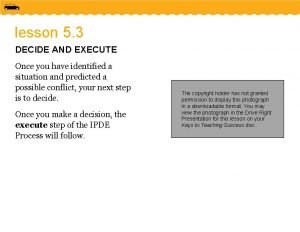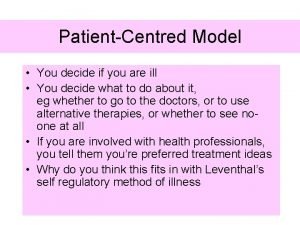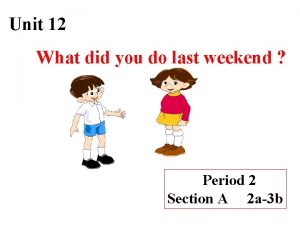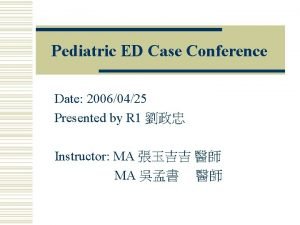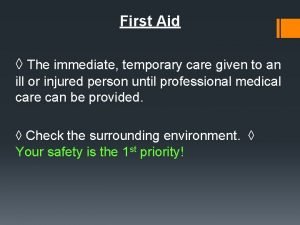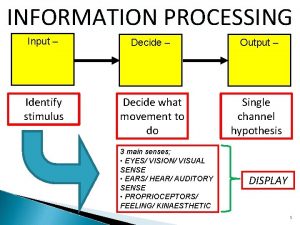PatientCentred Model You decide if you are ill















- Slides: 15

Patient-Centred Model • You decide if you are ill • You decide what to do about it, eg whether to go to the doctors, or to use alternative therapies, or whether to see noone at all • If you are involved with health professionals, you tell them you’re preferred treatment ideas • Why do you think this fits in with Leventhal’s self regulatory method of illness

Leventhal’s Self Regulatory Model of Illness (1980) 1. Problem Representation 2. Coping 3. Appraisal This model can be known as Patient. Centred because…

Leventhal’s Self Regulatory Model of Illness (1980) 1. Problem Representation 2. Coping 3. Appraisal • Problem Representation – how we decide if we are ill by: • Our own perception of internal sensations • Information from other people (lay referral system) • Our previous experiences of illness so YOU decide if YOU are ill by….

Leventhal’s Self Regulatory Model of Illness (1980) 1. Problem Representation 2. Coping 3. Appraisal Understanding of Physical Conditions • Identity – the signs & symptoms of a condition. We label the illness according to the symptoms • Consequences –We have certain ideas about what the illness will do to us • Causes – most people try and make sense of their illness by determining its cause eg genetic factors, stress, bad luck etc We have ideas about how we got the illness • Time line – We have beliefs about how long the illness will last (Acute, recurrent or chronic)

Leventhal’s Self Regulatory Model of Illness (1980) 1. Problem Representation 2. Coping 3. Appraisal 2. Coping - once we decide we are ill we are motivated to cope with this problem • Problem-focused coping: constructive actions to resolve the problem • Emotional-focused coping: behaviour to help relieve the worry & anxiety of being ill YOU decide how to treat the illness

Leventhal’s Self Regulatory Model of Illness (1980) 1. Problem Representation 2. Coping 3. Appraisal • Following their coping strategy, people go through a process of appraisal where they evaluate the success of their coping. This means they work out if their coping strategy has worked or not. • The appraisal stage leads back to the problem representation stage, eg trying to find if they have illness or disease. They go through the cycle until a state of normality is achieved. YOU decide if YOU are better and what to do next

Biomedical Model of Health & Illness • It looks at people as though they are a biological machine • If something is going wrong we need to fix the machine the way we might fix a car

Biomedical Model of Health & Illness Reductionism the model tries to reduce explanations of illness to the simplest possible process – if there is a biological problem it won’t then look at any other factors which could contribute to the illness, but just treat the ear ache Carol has head & ear ache. The medical model would treat the physical symptoms, but not look at the social factors which could have caused it. The medical model would give her medicine rather than investigate the social factors

Biomedical Model of Health & Illness Single Factor Causes The biomedical model looks for THE cause of a disorder rather than looking for a range of contributory factors. What factors could have caused this rash? How could it be treated (apart from medicine? )

Biomedical Model of Health & Illness Mind-body Distinction Western science has made a distinction between the mind and body. It sees people as split into two parts: body & soul, or ghost & machine

Biomedical Model of Health & Illness not Health “If it aint broke don’t fix it” is the idea behind the biomedical model. It deals with the development of illness rather than the promotion of good health.

The Social Model of Illness The social model of health places emphasis on changes that can be made in society and in people's own lifestyles to make the population healthier What differences could these people change about their lifestyle to have a healthier life?

The Social Model of Illness It defines illness from the point of view of the individual's functioning within their society rather than by looking at changes in biological or physiological signs. Which sociological perspective does this sound like to you?

The Biopsychosocial Model Ecological Systems Biosphere Life forms Human beings Social Systems Nation Culture Family Psychological Systems Cognition Emotion Behaviour Biological Systems Organs Tissue Cells Physical Systems Molecules Atoms Subatomic Particles

The Biopsychosocial Model I am a living biological being with thoughts and feelings. I am influenced by the way I was brought up, the country I live in, the way I process information, the way my body deals with illness and who I know. All these things affect my health.
 Mikael ferm
Mikael ferm Where you go i'll go where you stay ill stay
Where you go i'll go where you stay ill stay Identify predict decide execute
Identify predict decide execute You said i am feeling ill in indirect speech
You said i am feeling ill in indirect speech Biomedical model
Biomedical model Adm decide model
Adm decide model Adm decide model
Adm decide model Placement of encryption function in cryptography
Placement of encryption function in cryptography Did you ever have to finally decide
Did you ever have to finally decide Patriot loyalist or neutral you decide worksheet
Patriot loyalist or neutral you decide worksheet How was your last weekend answer
How was your last weekend answer Rapid ill
Rapid ill Ticls
Ticls Doth meaning
Doth meaning Immediate and temporary care given to a person
Immediate and temporary care given to a person Stalling objection
Stalling objection


